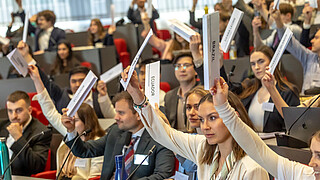In this simulated UN conference, parties reached a consensus on a global emissions peak in 2025, and on a 1.5 °C target. Two students from RSM were announced as 'best negotiators' at the conclusion of the event. Yann Liasse and Matthijs van Huijgevoort, both students on the MSc Global Business and Sustainability at RSM were presented with the award. They were among 30 students from RSM attending the event, and it was the fourth year in a row RSM students have received the coveted award.
The Model UNFCCC was held in May at Erasmus University, Rotterdam. The United Nations Framework Convention on Climate Change (UNFCCC) is the annual meeting of the Conference of Parties (COP). The simulation Model UNFCCC was attended by around 120 master students including RSM’s MSc International Management/CEMs students as part of the contingent from eight universities in the CEMS partnership, plus students from RSM's MSc Global Business & Sustainability. Taking part in the experiential learning conference concluded the CEMS Climate Change Strategy course for these students.
Students were assigned roles as different UN nations, civil society and industry groups as they negotiated climate change targets in a simulation of COP22, which will be held this November.
Hard to find common ground
After the meeting, Simon Reuch from the University of Cologne summed up the experience: “It's changed my perspective on the Paris agreement. Now I can see how hard it is to find common ground and why so many compromises end up happening.”
So what did students learn from this foray into international negotiation? Professor Rolf Wüstenhagen from St Gallen leads the debriefing that concludes the event. The delegate for China says, “This was a tremendous task: you really needed to balance what was good for your country with what was good for other countries, so it was about balancing domestic and international needs, short-term and long-term needs. I was surprised at how realistic it became.”
Toothless tiger?
One of the lobbyists says he was shocked at how easy it was to get countries to make concessions. Others agreed, saying that, in order to reach a consensus agreement, so many pieces had to be taken out that you ended with something completely different. Was the agreement in the end just a toothless tiger? “Sometimes it looks good but there's nothing behind it,” says one delegate, “and it's the same with a lot of official documents.”
Those with the least interest in committing for instance, were in the stronger position, says the delegate from the Philippines. “At the extreme ends, the incentive to not co-operate was very strong, so those most committed ended up being the most willing to compromise.”
The US delegate is surprised at the difference in bargaining power between countries: “To see the bargaining power that certain countries have over others has really surprised me. When the US said it could not ratify one part of the agreement it was immediately taken off. Their bargaining chip is higher, it's as simple as that. I knew this in theory but when you see it in reality, it is incredibly educational.”
One of the ENGO representatives points out that there might be a better way of thinking about these changes in the future: “Everyone equates reducing CO2 with reducing wealth, but if there were an alignment between wealth creation and CO2 reduction things would move faster.”
The event wrapped up with a speech by Professor Rafael Sardà from Esade: “This is the grim reality. We need to decouple wealth from environmental impact, or we are going to go into the great collapse. You need to act. If you want to become a good manager for this century you need to choose: the great decoupling, or the great collapse? It's in your hands.”
For a full report of the students’ experience of their Model UNFCC conference, click here.









